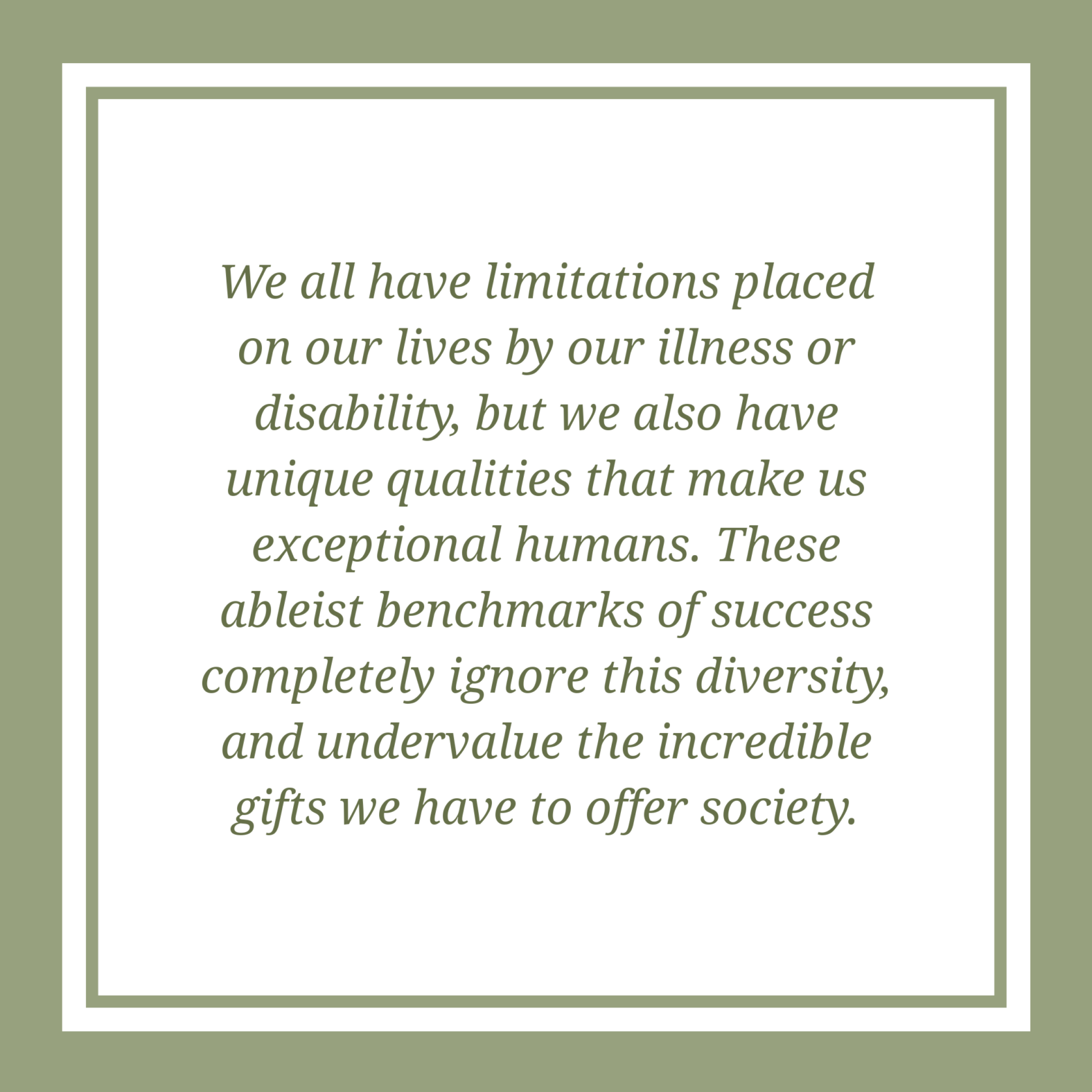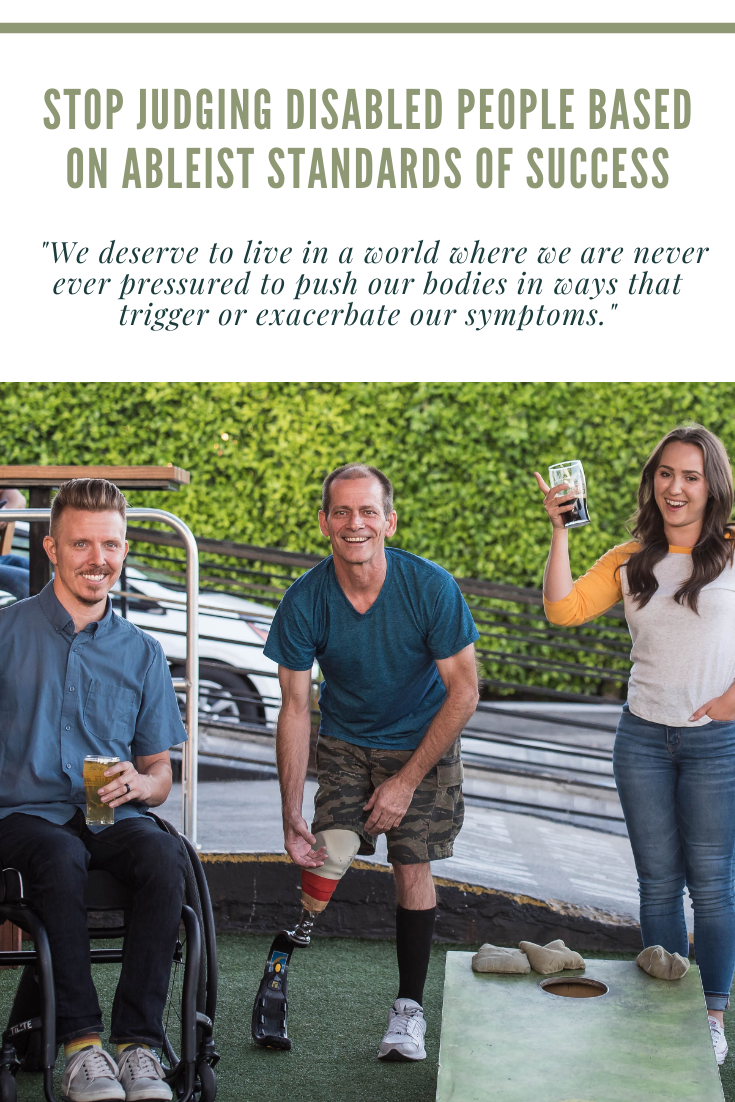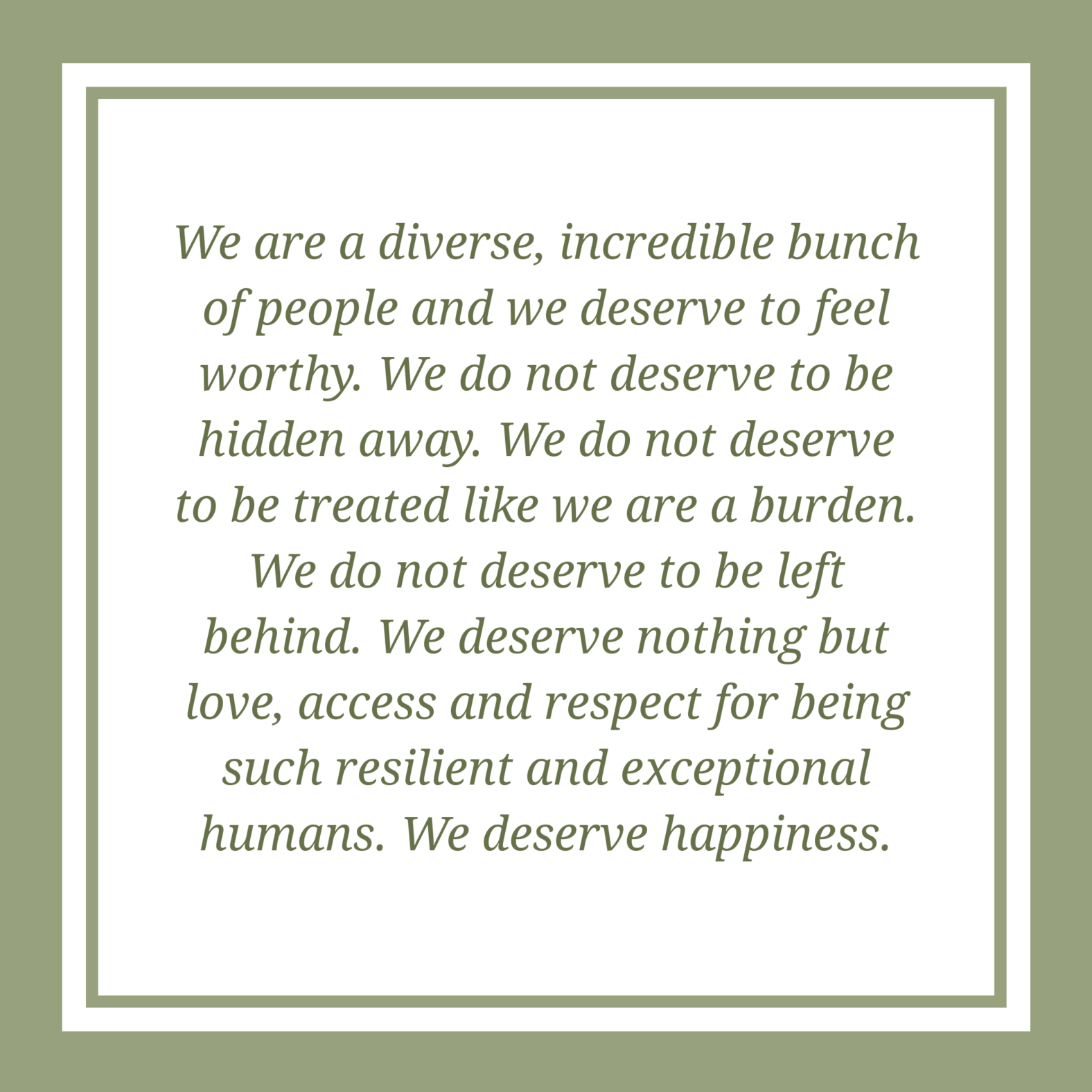
“Let’s celebrate disabled people. We are a diverse, incredible bunch and we deserve to feel worthy.”
Today I want to talk about how society as a whole judges chronically ill and disabled people’s successes, achievements and perceived failures based on ableist, non-disabled standards.
What do I mean by this?: We are only deemed successful if we can work full-time, exercise, drive a car, walk, live independently, go to university, have kids and raise a family. cook, clean and care for ourselves etc.
We all have limitations placed on our lives by our illness or disability, but we also have unique qualities that make us exceptional humans. These ableist benchmarks of success completely ignore this diversity, and undervalue the incredible gifts we have to offer society.
I want to discuss how damaging this narrative is, and urge you to take the time, for Disability Pride Month, to celebrate your achievements and to be proud of your disabled self.

How one insensitive comment triggered this post
I recently had an altercation with someone who has known me for 20 years, and is fully aware of how ill I am and the limitations this ill-health places on my life. Yet they felt the need to make a comment, and judgement.
As many of you are aware I started playing guitar again recently after a 20 year gap. I’m having to learn how to adapt to playing lying down as I’m bedbound, but I’m thoroughly enjoying playing again. The last few months have been particularly hard for me following my marriage break down. I’m now living alone and having to do so much more for myself, as I no longer have my (ex) husband to help care for me, and this has led to many additional challenges and consequently a deterioration in my health.
We were having a relaxed and lighthearted chat about my guitar playing when this person made the following insensitive comment: “Now you just need to sit up in the chair and play”.
They knew perfectly well I cannot sit up – sitting even for two mins causes extreme pain and dizziness, and leaves me suffering for hours, sometimes days. I’ve been like this for over 7 years. Why are people like this? Why should I strive to do something that will severely damage my health when I’m barely coping as it is? Isn’t it better to make the best of how I am, right now?
This one throwaway comment completely ignored the limitations placed on my life by my ill-health and judged my achievements based on what healthy, non-disabled people perceive to be important and an indicator of success. It dismissed all the achievements I’ve made despite the shitstorm that is my life at the moment. It felt like this person was telling me I’ve given up and I’m not trying hard enough. And I got angry.
Ableist standards of success
The reason I have made so many improvements in my physical and mental health over the past few years is because I stopped forcing my body to do stuff that it couldn’t do without severe negative consequences.
Instead of focusing on what society deemed as recovery or being successful as a disabled person, I focused on listening to my body, I focused on nurturing my mind, I focused on acceptance, I focused on finding purpose and joy in the limited life I have been given. I focused on educating myself, on resting, on being kind to my body, I focused on finding goals I could work towards that didn’t cause me to be in a constant state of a crash.
And for this I’m deemed a failure because I haven’t spent the time punishing my body in an attempt to achieve what non-disabled people perceive to be successful.
This is ableist thinking…
If a disabled person uses a wheelchair, society believes their biggest goal should be to one day walk again, and thinks they should spend their time tirelessly pushing towards this achievement irrespective of the cost to their health and happiness.
But the truth is in most cases striving for this only causes pain, frustration, more limitations, loss of independence, and loss of freedom. Isn’t it much more desirable for a disabled person to continue using their wheelchair if it means less pain, less injury, less fatigue, more independence, more fun, more freedom? Why is walking seen as the ultimate goal? Why are wheelchairs seen in such a negative light? Why are wheelchair users seen as failures or weak because they need to use a wheelchair?
The wheel is often cited as the most important invention of all time. It is linked with efficiency, convenience and fun. It’s almost universally seen as a positive edition to daily life. So why is it that when wheels are added to a chair it somehow becomes something negative? Something to be avoided or ashamed of, when the opposite is true? Mobility aids like wheelchairs are a positive and valuable addition to disabled people’s lives, offering independence and freedom.
We, as a society, need to re-evaluate how we measure success and judge self-worth.

In an ideal world…
Obviously in an ideal world I would want to be mobile – of course I want my old life back. But this isn’t an ideal world and no matter how much I try, striving to reach these ableist and unachievable goals (for now) will only cause me harm. I pushed my body for years completely ignoring it’s cries for help, and for mercy. This way of living is what put me in this situation – bedbound and severely ill. I know my body now and I do my best to listen to it. I do not need someone else to come along and criticise how I’m living my life, or to judge what I do, or don’t do, each day to survive.
Please trust, after all these years, I know what’s best for my body.
I would like to pose a question to healthy, non-disabled people;
Would you do something each day that you knew would set off a chain reaction of symptoms that would cause a crash which could last for days or weeks?: Pain, dizziness, exhaustion, palpitations, brain fog… and leave you unable to do vital tasks like eat or sleep? I’m pretty sure the answer would be ‘No’, so please stop forcing this criticism on disabled and chronically ill people everywhere.
We deserve to live in a world where we are never ever pressured to push our bodies in ways that trigger or exacerbate our symptoms.
Let’s celebrate disabled people
Ableism is rife in society and it teaches us that we should be ashamed of being disabled. It instills the notion that we are weak, unworthy, a burden and an inconvenience.

July is Disability Pride Month. So let’s celebrate disabled people. We are a diverse, incredible bunch and we deserve to feel worthy. We do not deserve to be hidden away. We do not deserve to be treated like we are a burden. We do not deserve to be left behind. We deserve nothing but love, access and respect for being such resilient and exceptional humans. We deserve happiness.
With that in mind, I have compiled a list of things I’m proud of, and I urge you to do the same:
- My writing – I wouldn’t be a writer if it wasn’t for my ill-health and disabilities and I’m very proud of my blog
- Giving others a voice – my blog and social media presence allow me to amplify the voices of those who don’t have a platform
- The ME wishes Campaign – I’m particularly proud of how successful this was
- All my awareness campaign work
- I’m kind, supportive, intelligent and resilient
- Coping despite my ill-health and the stress of the last few months
- Living by myself for the first time in 18 years
- Surviving – not giving up although there have been many times I have wanted to
- The positive work I have done to improve my mental health
- Playing guitar again after 20 years – while bedbound
- Being a good friend
- Learning to be kind to myself despite years of feeling unworthy
- Getting better at listening to my body and resting which has led to improved health
- Being an ally to friends within marginalised communities
What are you proud of?
I have forged myself a life within the limited boundaries allowed by my ill-health, and I’m really proud of this. I refuse to let ableist views of success make me feel unworthy or a failure.
Please take a few minutes to write down your achievements and what makes you proud to be you.
Thank you for your support. I look forward to reading your comments.
I reached out to my Twitter friends in preparation for this post and I was overwhelmed by the response. It’s obvious to me that a much bigger discussion is needed around this topic, especially about the unfair judgements healthy, non-disabled people make about those of us living with invisible disabilities or illnesses. Because this deserves more attention, I will write about it in a separate post.
For more personal stories, reviews, news, inspirational quotes and in-depth discussion, please head over to my Facebook page.

Brilliant post-Jo and reminds me of when my friend told me if I carried on using my wheelchair I would never get out of it, what she didn’t see was that I use the wheelchair so I can carry on xx
Thank you Rachael. I’ve had similar comments from people too, including doctors.
Love the message of this post!
Thank you Kate. I think it’s an important message.
Your comment about wheels got me thinking… You could also ask an able-bodied person why they use a car when they can walk. …and most people who wear glasses can still see to a degree even without them so why wear them? It’s exactly the same but people never consider it.
You think the same as me. I have another post half written about this subject. It includes a section comparing the convenience of wheelchairs for disabled people, to cars or bikes for non-disabled people. I hope it helps more people understand why we use wheelchairs and helps dispel the many myths.
We also have to contend with the ableism measure of success (often causing guilt) that is ingrained in us that we have to work hard to let go so that we can live fully with the limitations that we’re given. Thank you for writing this, Jo. And I think it rocks that you’re playing your guitar again.
Thank you Katie
Thank you for sharing this post. It hit me that I had these underlying prejudices, despite being around people with disabilities All. My life. I had so much trouble admitting I needed support. Aids such as having a stairlift, walkers and my wheelchair we’re a huge thing to accept and I carried on taking 1/2 an hour to crawl up to my bed for so long because of fear, guilt and showing weakness and my vulnerability. I haven’t thought of this for ages but I’m sure that pushing on has made my condition much worse, bedbound most of the time. I can get cross about the lack of access and the fact that I feel like an inconvenience in shops. I apologise too much, so I’m going to stop. I always celebrate my wins, big or small, but today I had a wash, started my next blog and listened to my body needing to rest. All a huge achievement for me today! Thanks again!,
Laura, reading your comment made me feel as though I were looking in a mirror. I have had multiple disabling conditions for almost 12 years, with many others that had begun over 30 years ago. I ignored my body’s warnings and symptoms for, literally, decades, until it ALL came crashing down. When it did, I was still working full-time as an ICU RN, and had finally left a misogynistic, narcissistic, abusive ex-husband behind and restarted a new life with my daughter as a single mom again 2500 miles away from my home, my friends and everything I had known. I was coping, I thought, until things collapsed. Then, and ever since, I realized I had never fully realized how bad things could get. I have spent the last decade learning to live with my new limitations, which can change very frequently, and also learning to live with what my limitations mean and “look like” to those around me who I needed to be in support of me in some way. I’ve learned to live with more anger and disappointment than I ever thought possible, plus fear and frustration and more anger – directed inward and outward. I have learned that anyone can have “ableist” expectations of me, even if they, too, are disabled. Depression has been a crippling truth as well as the physical pain, fatigue, exhaustion, anxiety, fear and the crushing realization that nothing will ever be “good enough” for some, ever again. The physical and emotional losses we suffer are never ending, it seems, yet our “malingering” is what people see.
I am now living alone for the first time since I was kicked out of my mother’s house at 18, when I was pregnant and single and very much alone, I thought. It has only been lately that I realized that I had never been alone before, as long as my daughter was with me, even before her birth. I am just now, 50+ years on this earth, understanding and appreciating how it can feel to be ABLE to be alone! Even being disabled, I am learning to live alone and truly enjoy it, as well. I am finding it easier to be able to listen to my body’s warnings and signals about impending crashes or pain or fibro flares by only having to meet my own needs every day. I have never, ever done this before. I have always been the mother, the nurse, the wife, the child….ALWAYS putting the needs of anyone and everyone above myself. ALWAYS. Not any more. I’m really trying. I am trying to stop apologizing for everything i do, or don’t do. I have spent years of my life apologizing for just being alive. I am trying to learn to stop.
I hope by reading blogs like Jo’s and Andie’s, that it will help me be a stronger me for myself. I think you all understand that.
It’s brilliant that you’ve picked up the guitar again, and that it brings you enjoyment. Although I’ve always had SMA, my disability is progressive which means I often have to adapt the things I love to ways that I can do them. I’m an avid crafter and probably look very award sometimes. I don’t do things as quickly or easily as some, but I do and enjoy them.
Our limitations and illnesses make us creative and adaptable. Be you. Who wants to be regular anyway!
This is a wonderful article, and I hope it makes able-bodied people think more about how they say things. Most of the time they’re not said with ill-intent, they’re more said with wishful thinking. When you’re ill you “always get better eventually “, right?! Able-bodied people naturally think that way.
We are the realists, and they think we feel hopeless about our health, and we’d “get better” if we were just a bit more optimistic about our situation. That goal-setting is something we need to do to get on the road to recovery.
Nobody wishes they were healthy more than us, and if it were that easy we’d all be doing cartwheels by now!
I’ve encountered situations like this too, and it’s so hurtful. People make these throwaway comments that they don’t think twice about afterwards, but they linger on for us and eat away at us, sadly. Rightfully so….
Thank you, Jo. I’m a bit late, but I tripped over this series of blogs as I’ve been tring to navigate my “new normal” while basically at the beginning of a diagnosis process. It’s the beginning, despite having suffered for a while, because I was lucky enough to find a non-dismissive doctor. I’m going to try hard to remember the things I’m proud of. It’s a bit difficult today. One item I can offer is that I can be there for my girls, even when I’m stuck in bed. I’m glad they know they can come to me and that they do come. Another is probably that I’m learning how to articulate my needs, which is helping me understand others’ needs better.